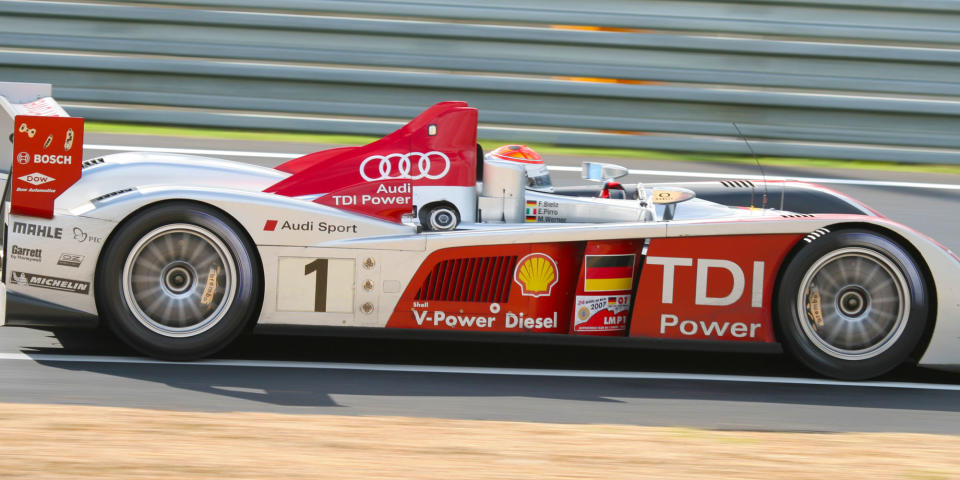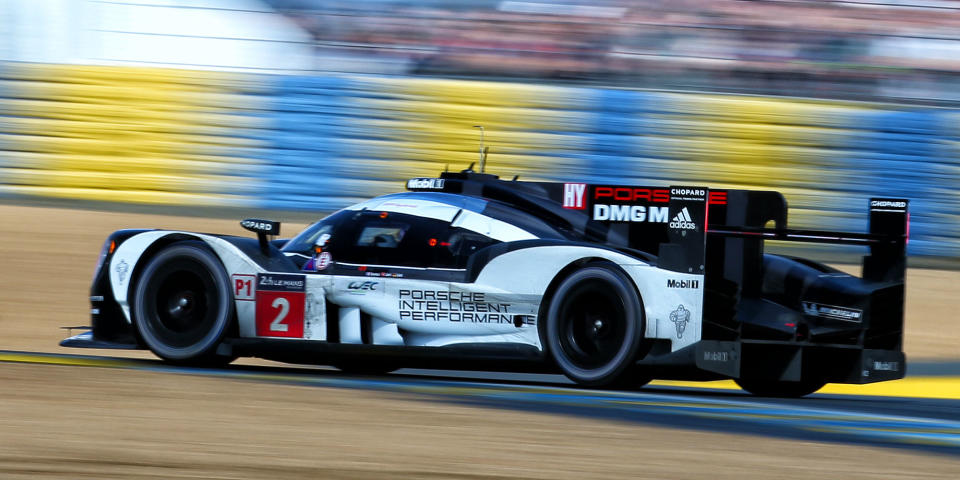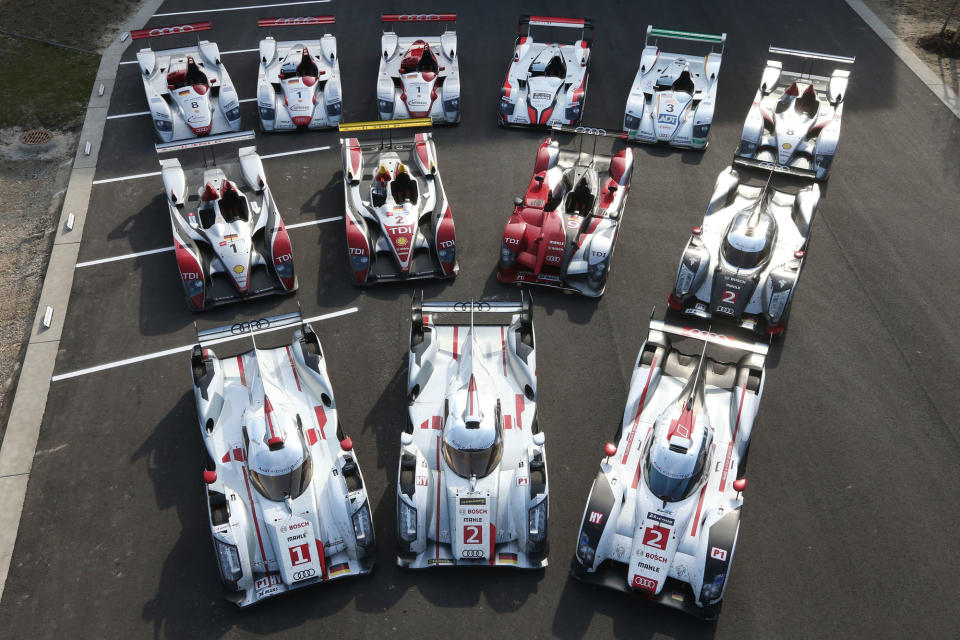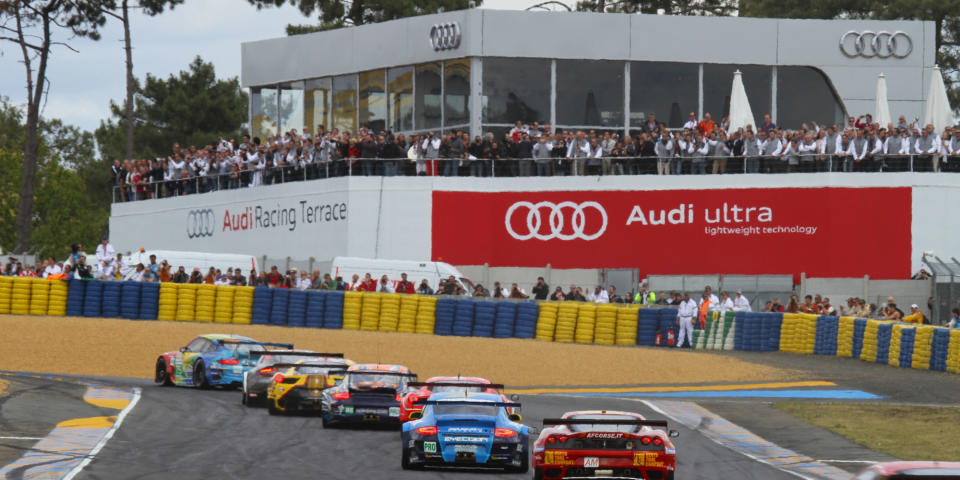Audi's Exit From Le Mans Will Send Shockwaves Through the Sport

Blame Dieselgate. Blame increasingly uncompetitive technology. Blame time.
The news of Audi's upcoming departure from its long reign atop global sports car racing was as shocking as it was inevitable. Reasoning behind the withdrawal was painfully Germanic: a calculated business move, and nothing more. And even if it was inevitable, the loss of Audi from the WEC is on par with McLaren leaving F1, Ford leaving NASCAR, or Ganassi leaving Indycar. Make no mistake, this is a big deal.
The same machine-like efficiency Audi introduced to the 24 Hours of Le Mans in 1999 was applied by its board of directors-and its accounting department-to forecasting its future at the French endurance classic. With a rumored annual investment of a half-billion dollars to consider, the numbers seemingly stopped making sense for the brand.
You won't find much in the way of mystery here.
The first axe started its slow and silent fall when VW's Dieselgate scandal broke on Sept. 18, 2015. Volkswagen Audi Group (VAG) didn't know the size of the fine at the time, but it knew its bottom line would take a massive hit at some point. It finally arrived on Tuesday.
Following the announcement of a $15 billion buyback settlement in North America alone, Less than 24 hours later, Wednesday's decision to cleave one of VAG's two most expensive racing projects from the books was the inevitable response. Porsche's gasoline-fueled Le Mans program, which is said to command the same half-billion-dollar investment each year, was spared.

Shortly after Dieselgate broke, insiders told me every racing program within VAG was instructed to drop whatever wasn't turning a profit or adding to the company's reputation. Coming off of two lopsided Le Mans losses courtesy of sister brand Porsche (and a prolonged drubbing in the FIA World Endurance Championship at the hand of Porsche's 919 Hybrid), Audi Sport's LMP1 program was unable to meet either of VAG's self-imposed sustainability criteria.
On the engineering front, Porsche (and Toyota, to a lesser degree) also made it hard to ignore the era of Audi's turbodiesel dominance had reached its natural conclusion.

Once the featherweight 919 and its barely-there V4 turbo arrived, Audi's strong-but-hefty V6 became a glaring performance liability. Where the Porsche's tiny drivetrain helps the 919 to turn and brake with alarming fluidity-it's a marvel of chassis balance perfection, the R18's high engine weight has painted Audi's design team into an unenviable position. Like a giant boulder strapped to its back, every single decision made with the R18 chassis since 2015 has involved overcoming the kinematic nightmare in the engine bay.
This year's R18-the most radical LMP1 machine ever built-took weight reduction to psychotic levels in a bid to recapture Audi's Le Mans glory. On appearances alone, it has also managed to make the 919 and Toyota TS050 look tame.

The wild, Formula 1-inspired high nose, size-zero packaging at the front of the chassis, and revolutionary aerodynamics were employed to bridge the increasing gap to its rivals. Audi threw everything it could think of at the reimagined turbodiesel R18 (at significant cost) and so far, through seven WEC rounds, Porsche has five wins; Toyota and Audi have one apiece.
Despite all of the effort and advancement, the new R18 has failed in its mission to overtake its VAG stablemate
To turn the tide, a new, skinny, non-diesel solution would be required, and with it, the entire concept of the R18 would also need to change. Take whatever the latest R18 cost VAG, triple it, and that's what Audi Sport would need to reassert its dominance at Le Mans. In light of the Dieselgate's financial clampdown, and having spent a fortune on the 2016 model, Audi Sport's turbodiesel decline came at the worst possible time and sealed the program's fate.
One friend inside the Le Mans team estimates 600 people, from Audi employees to subcontractors to outside vendors, will be impacted by the dissolution of the Le Mans project.
"It's like losing a friend," he said. "It's going to change the dynamics of a lot of people's families and lives."

Once the Le Mans program winds down at the end of November, Audi Sport will turn its full attention to the all-electric FIA Formula E open-wheel series. Thanks to the (mostly) spec nature of Formula E, only a small portion of the vast engineering and mechanical expertise contained within Audi's Le Mans program is expected to be redeployed to the new venture.
Formula E has struggled to earn a following, meaningful TV ratings, and commercial success, but with Audi-the titans of endurance racing and forward-looking technology-opting in, the series has gained its first legitimizing presence.
For a series built on little more than hype, Audi could be a transformative entrant in Formula E. Take everything the brand has done to drive fans towards Le Mans since 1999-all of the sport-meets-technology promotional campaigns, apply that blueprint to Formula E, and Audi could help the series connect with its target audience in new and meaningful ways.
Outside of the 600-plus who are in for significant changes at Audi Sport, the Le Mans program's central home, the FIA World Endurance Championship, is about to face its most daunting stress test. The WEC experienced a similar shock when Peugeot scuttled its Le Mans effort shortly before the 2012 season got under way, but it had the comforting presence of Audi and the incoming Toyota program to lean on.
Although there are similarities on the surface, Audi's exit is unlike anything the series encountered when Peugeot packed up and left. Yes, the French manufacturer was an important part of the championship, but it came and went in five years and was rarely accused of spending the kind of money Audi lavished on the sport. With Peugeot, Le Mans only lost its second-best customer. With Audi, the 24 Hour and the WEC series is staring into the terrifying void it always feared.
How many television, print, radio and web advertisements has Audi purchased each year to support its Le Mans program and the season-long WEC effort? How many race tickets, hospitality suites, catered meals, servers, valets, hosts, security guards, and trackside banners has Audi paid for at every race? How many hotel rooms, rental cars, and flights have been booked at each round, and how much have those items contributed to local economies? How many drivers, engineers, mechanics, truck drivers, marketing and PR staff, travel coordinators, and support personnel currently rely on Audi to feed their families? How many former drivers have been kept on the payroll as brand ambassadors?

How much money does Audi pump directly into the 24 Hours of Le Mans and the WEC through marketing rights, special promotions, renting space for hospitality compounds and trackside support buses, to have its vehicles used as the exclusive pace car supplier, to place in-car cameras in the R18s, to use the Le Mans and WEC logos…
After 18 intertwined years, sports car racing's richest financial circulation system will stop beating. The WEC's biggest spender is leaving and Le Mans is in for a huge budget shortfall.
There are real concerns about the short-term health and long-term viability of the WEC without Audi. From a practical standpoint, and with Porsche's 919 serving as the standard bearer, how many manufacturers are prepared to match or exceed $500,000,000 per year to play for the win?
At the steep buy-in price, and the three to five years needed to develop a new Le Mans prototype into a contender, there's no guarantee a replacement for Audi will appear. The tone of the conversation would be entirely different if another manufacturer was on the horizon, and until that brand is identified, or changes are made to bring the costs down, the ramifications of Audi's departure will weigh heavily on the sport.
After losing its cash cow-its headliner-to Formula E, Le Mans and the WEC have a long winter ahead.
You Might Also Like

